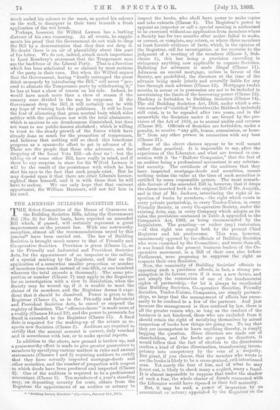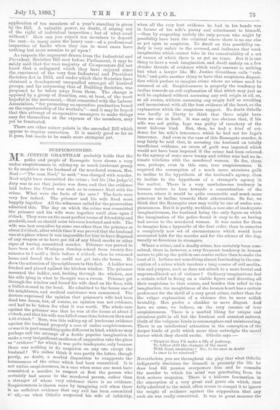THE AMENDED BUILDING SOCIETIES BILL. T HE Select Committee of the
House of Commons on the Building Societies Bills, taking the Government Bill (No. 2) for their basis, have reported an amended Bill which, if passed, will certainly represent a great improvement on the present law. With one noteworthy exception, almost all the recommendations urged by this journal* have been carried out. The law of Building Societies is brought much nearer to that of Friendly and Co-operative Societies. Provision is given (Clause 5), as in the Friendly and Industrial and Provident Societies Acts, for the appointment of an inspector or the calling of a special meeting by the Registrar, and that on the application of a somewhat smaller proportion or number of members (one-tenth instead of one-fifth, or one hundred wherever the total exceeds a thousand). The same pro- portion or number (Clause 7) may apply to the Registrar for an investigation with a view to dissolution, when the Society may be wound up, if it is unable to meet the claims of its members, and the Registrar deems it expe- dient that it should be dissolved. Power is given to the Registrar (Clause 6), as in the Friendly and Industrial and Provident Societies Acts, to cancel or suspend the registry of Societies. The "offences clause " is made more of a reality (Clauses 18 and 19), and thepower to prosecute for fraud is extended to the Registrar (Clause 15). A fixed date is required for the making-up of the return as re- spects new Societies (Clause 2). Auditors are required to certify that the annual account is correct, duly vouched and in accordance with law, or to make special reports.
In addition to the above, new ground is broken up, and a praiseworthy effort is made to give greater guarantees to members by specifying various matters in rules and annual statements (Clauses 1 and 2) requiring auditors to certify that they have actually inspected mortgage-deeds and other securities, and the number of properties with respect to which deeds have been produced and inspected (Clause 2). One of the auditors is required to be a professional accountant (Clause 3). Ten members of a year's standing may, on depositing security for costs, obtain from the Registrar the appointment of an auditor or actuary to • "Building Society Mischiefs" (Spectator, January 21st, 1853). inspect the books, who shall have power to make copies and take extracts (Clause 4). The Registrar's power to appoint an inspector or call a special meeting is authorised to be exercised without an application from members where a, Society has for two months after notice failed to make, or correct, or complete, any return, or where three members at least furnish evidence of facts, which, in the opinion of the Registrar, call for investigation or for recourse to the judgment of a meeting of the members (Clause 5, Sub- clause 5), this last being a provision exceeding in stringency anything now applicable to cognate Societies. Balloting for advances is made illegal (Clause 11). Advances on second. mortgage, unless in favour of the Society, are prohibited, the directors at the time of the advance being made jointly and severally liable: for any loss through such advance (Clause 12). Mortgages twelve months in arrear or in possession are not to be included in ascertaining the limits of the borrowing power (Clause 13). Banking is forbidden to Building Societies (Clause 14). The old Building Societies Act, 1836, under which a cer- tain number of "certified " Societies (the Birkbeck included) still exist, is to be repealed after two years, and in the meanwhile the Societies under it are bound by the pro- vision of the Act of 1876, as to annual audits and returns (Clause 20). Officials of Societies are forbidden, under a penalty, to receive " any gift, bonus, commission, or bene- fit" from any other person in connection with any loan (Clause 21).
Some of the above clauses appear to be well meant rather than practical. It is impossible to say, after the experience of the Liberator, and what are termed in con- nection with it the "Balfour Companies," that the fact of an auditor being a professional accountant is any substan- tial security. The certificate of the auditors that they have inspected mortgage-deeds and securities, means nothing unless the value at the time of such securities is certified by some responsible person. The most remark- able feature of the amended Bill is, however, that it drops the clause inserted both in the original Bill of Mr. Asquith, and in that of Mr. Jackson, introdtcing the right of in- spection of books by members,—the right which exists in every private partnership, in every Trades-Union, in every Friendly Society, in every Co-operative Society, under the existing Acts, nay, in every Company which adopts as its rules the provisions contained in Table A appended to the Companies Act, 1862, as being recommended by the Legislature. The granting—or rather (say) restoration —of this right was urged both by the present Chief Registrar and his predecessor, This was, however, unanimously opposed by the officials of Building Societies who were examined by the Committee ; and worse than all, it was found that the present business leaders of the Co- operative movement, in a Bill of their own also before Parliament, were proposing to suppress the right as respects their own Societies. Now, the unanimity. of Building Societies' officials in opposing such a provision affords, in fact, a strong pre- sumption in its favour, even if it were a new device, and not simply the restoration of one of the fundamental rights of partnership,—for let it always be recollected that Building Societies, Co-operative Societies, Friendly Societies, Trades-Unions, Companies, are simply partner- ships, so large that the management of affairs has neces- sarily to be confined to a few of the partners. And just because the management is thus confined by law, there is all the greater reason why, so long as the conduct of the business is not hindered, those who are excluded from it should retain the right of satisfying themselves by actual inspection of books how things are going on. To say that they are incompetent to learn anything thereby, is simply begging the question. Since directors are made out of shareholders, and the books are open to directors, it would follow that the fact of election to the directorate confers a kind of divine illumination, transforming incom- petency into competency by the vote of a majority. But grant, if you choose, that the member who wants to see the books is likely to be a cross-grained, evil-intentioned man. Yet surely the fear of him, and of what he may ferret out, is likely to cheek many a, neglect, many a fraud. It is almost impossible to suppose that under the shadow of such a fear, the whole cluster of frauds connected with the Liberator would have ripened to their full maturity. But, it may be said, a, power of inspection by an accountant or actuary appointed by the Registrar on the application of ten members of a year's standing is given by the Bill. A valuable power, no doubt, if arising out of the right of individual inspection ; but of what avail without ? How can you expect ten members to deposit the cost—in many cases the heavy cost—of a professional inspection of books when they can in most cases have nothing but mere surmise to go upon?
As respects the argument drawn from the Industrial and Provident Societies Bill now before Parliament, it may be safely said that the vast majority of Co-operators did not know that a safeguard which they have enjoyed since the enactment of the very first Industrial and Provident Societies Act in 1852, and under which their Societies have obtained a development unequalled amongst all kindred groups, and far surpassing that of Building Societies, was proposed to be taken away from them. The change is opposed by a group of Societies, one, at least, of the most hopeful in the movement, —that connected with the Labour Association, " for promoting co-operative production based on the copartnership of the workers,"—and it may be hoped that this attempt of co-operative managers to make things easy for themselves at the expense of the members, may yet be frustrated.
There are other minor points in the amended Bill which appear to require correction. It is mainly good so far as it goes, but needs to be made more stringent yet.



































 Previous page
Previous page